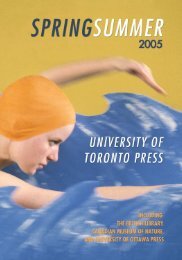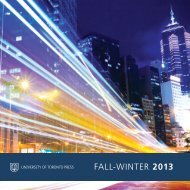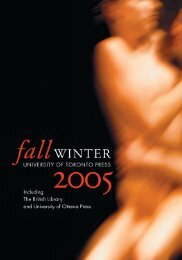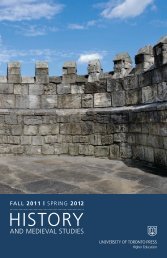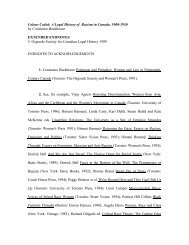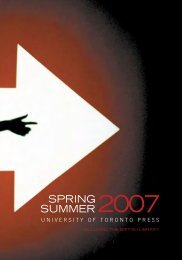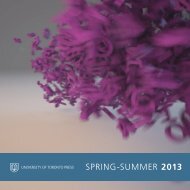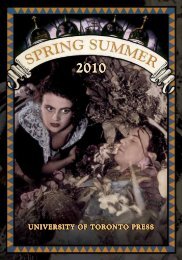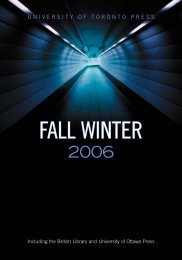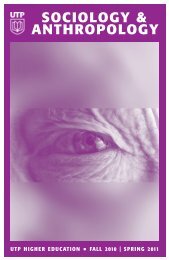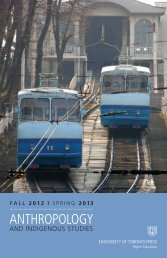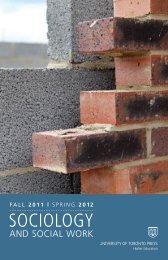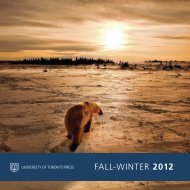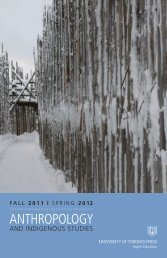Classics, Medieval & Renaissance 2012 - University of Toronto ...
Classics, Medieval & Renaissance 2012 - University of Toronto ...
Classics, Medieval & Renaissance 2012 - University of Toronto ...
Create successful ePaper yourself
Turn your PDF publications into a flip-book with our unique Google optimized e-Paper software.
LITERATURE<br />
They Need Nothing<br />
Hispanic-Asian Encounters <strong>of</strong> the Colonial Period<br />
NEW<br />
Robert Richmond Ellis<br />
The first comprehensive study <strong>of</strong> Spanish writings<br />
on East and Southeast Asia from the Spanish colonial<br />
period, They Need Nothing draws attention to many<br />
essential but understudied Spanish-language texts<br />
from this era. Robert Richmond Ellis provides an<br />
engaging, interdisciplinary examination <strong>of</strong> how<br />
these writings depict Asia and Asians as both similar<br />
to and different from Europe and Europeans, and<br />
details how East and Southeast Asians reacted to<br />
the Spanish presence in Asia.<br />
They Need Nothing highlights texts related to<br />
Japan, China, Cambodia, and the Philippines,<br />
beginning with Francis Xavier’s observations <strong>of</strong> Japan<br />
in the mid-sixteenth century and ending with José<br />
Rizal’s responses to the legacy <strong>of</strong> Spanish colonialism<br />
in the late nineteenth century. Ellis provides a groundbreaking<br />
expansion <strong>of</strong> the geographical and cultural<br />
contours <strong>of</strong> Hispanism that bridges the fields <strong>of</strong><br />
European, Latin American, and Asian Studies.<br />
Robert Richmond Ellis is Norman Bridge Distinguished<br />
Pr<strong>of</strong>essor <strong>of</strong> Spanish at Occidental College.<br />
Approx. 240 pp / 7 illustrations / 6 x 9 / August <strong>2012</strong><br />
Cloth 978-1-4426-4511-0 $55.00 (£38.99)<br />
Cervantes, Literature, and the Discourse <strong>of</strong> Politics<br />
NEW<br />
Anthony J. Cascardi<br />
What is the role <strong>of</strong> literature in the formation <strong>of</strong> the<br />
state Anthony J. Cascardi takes up this fundamental<br />
question in Cervantes, Literature, and the Discourse<br />
<strong>of</strong> Politics, a comprehensive analysis <strong>of</strong> the presence<br />
<strong>of</strong> politics in Don Quixote.<br />
Cascardi convincingly re-engages the ancient roots<br />
<strong>of</strong> political theory in modern literature by situating<br />
Cervantes within a long line <strong>of</strong> political thinkers. He<br />
also shows how Cervantes’ view <strong>of</strong> literature provided<br />
a compelling alternative to the modern, scientific<br />
politics <strong>of</strong> Machiavelli and Hobbes, highlighting the<br />
potential interplay <strong>of</strong> literature and politics in an<br />
ideal state.<br />
Anthony J. Cascardi is the Dean <strong>of</strong> Arts and Humanities,<br />
and Ancker Pr<strong>of</strong>essor <strong>of</strong> Comparative Literature,<br />
Rhetoric, and Spanish at the <strong>University</strong> <strong>of</strong> California,<br />
Berkeley.<br />
‘By exploring Cervantes’ literary production from the<br />
perspective <strong>of</strong> political philosophy, Cervantes, Literature,<br />
and the Discourse <strong>of</strong> Politics makes a fascinating,<br />
thought-provoking contribution to our understanding<br />
<strong>of</strong> the Spanish author and playwright.’<br />
David Castillo, State <strong>University</strong> <strong>of</strong> New York at Buffalo<br />
(<strong>Toronto</strong> Iberic)<br />
352 pp / 6 x 9 / January <strong>2012</strong><br />
Cloth 978-1-4426-4371-0 $75.00 (£52.99)<br />
Paper 978-1-4426-1223-5 $32.95 (£23.99)<br />
Don Quixote among the Saracens<br />
A Clash <strong>of</strong> Civilizations and Literary Genres<br />
Honourable Mention in the<br />
American Publishers Awards<br />
for Pr<strong>of</strong>essional and<br />
Scholarly Excellence<br />
(Literature Category)<br />
NEW<br />
Frederick A. de Armas<br />
The fictional Don Quixote was constantly defeated<br />
in his knightly adventures. In writing Quixote’s story,<br />
however, Miguel Cervantes succeeded in a different<br />
kind <strong>of</strong> quest – the creation <strong>of</strong> a modern novel that<br />
‘conquers’ and assimilates countless literary genres.<br />
Don Quixote among the Saracens considers how<br />
Cervantes’ work reflects the clash <strong>of</strong> civilizations and<br />
anxieties towards cultural pluralism that permeated<br />
Golden Age Spain.<br />
Frederick A. de Armas unravels an essential mystery<br />
<strong>of</strong> one <strong>of</strong> world literature’s best known figures: why<br />
Quixote sets out to revive knight errantry, and why<br />
he comes to feel at home only among the Moorish<br />
‘Saracens,’ a people whom Quixote feared at the<br />
beginning <strong>of</strong> the novel.<br />
Frederick A. de Armas is the Andrew W. Mellon<br />
Distinguished Service Pr<strong>of</strong>essor in the Humanities,<br />
Spanish Literature, and Comparative Literature at<br />
the <strong>University</strong> <strong>of</strong> Chicago.<br />
‘A must-read for anyone interested in Cervantes’ work,<br />
Don Quixote among the Saracens exemplifies Frederick<br />
A. de Armas’s immense erudition, superb analytical<br />
skills, and attention to detail.’<br />
Enrique García Santo-Tomás, <strong>University</strong> <strong>of</strong> Michigan<br />
256 pp / 4 illustrations / 6 x 9 / 2011<br />
Cloth 978-1-4426-4345-1 $60.00 (£41.99)<br />
utppublishing.com 29



